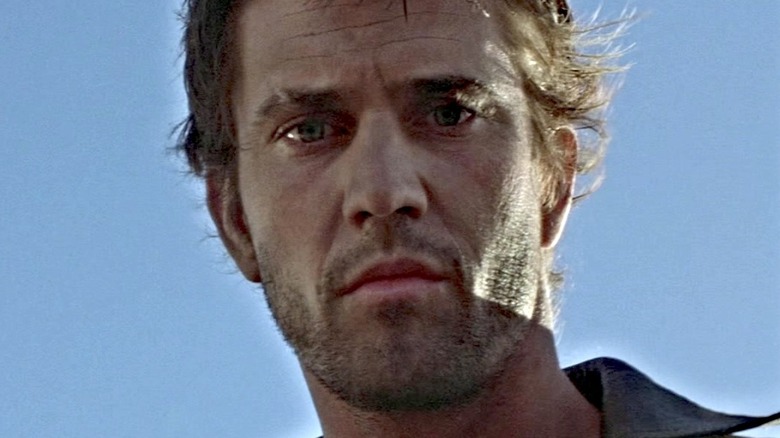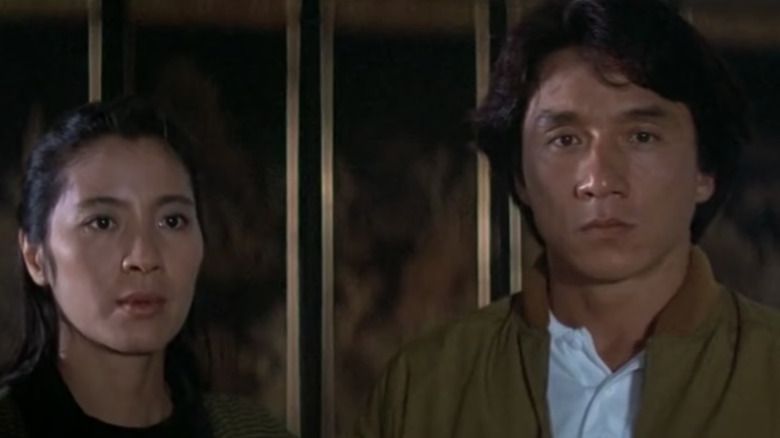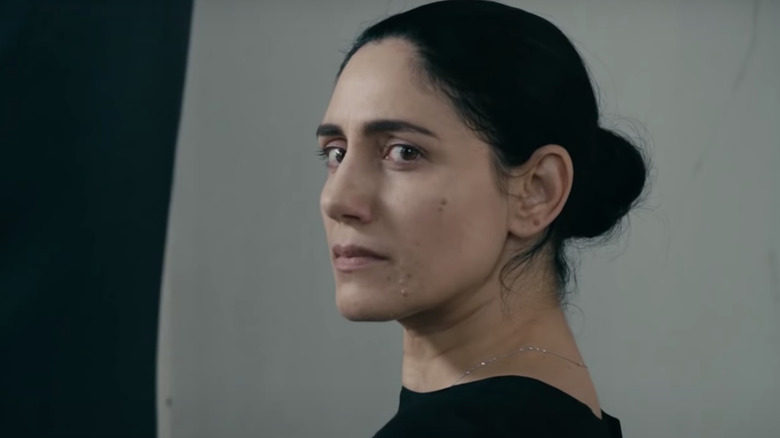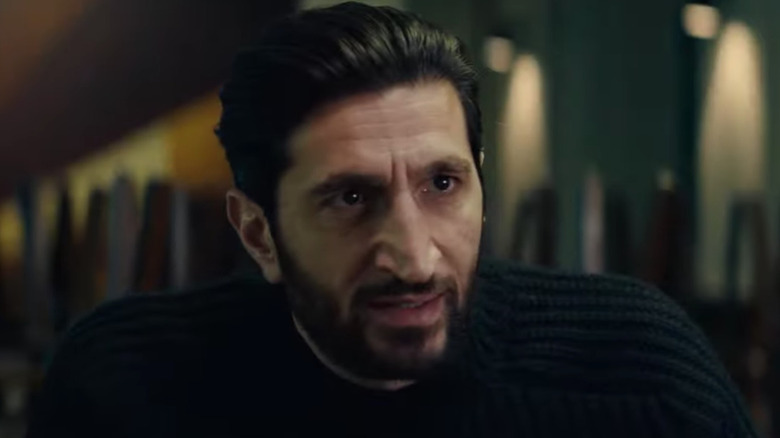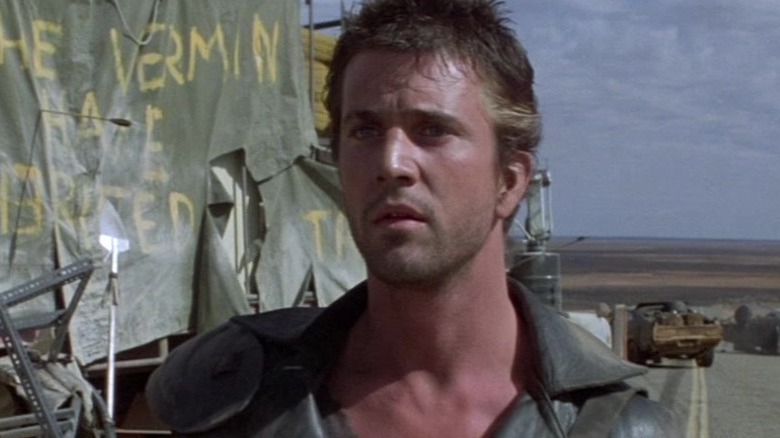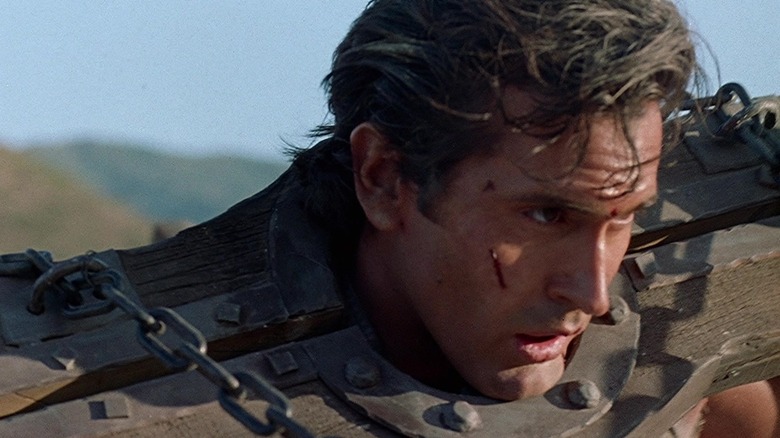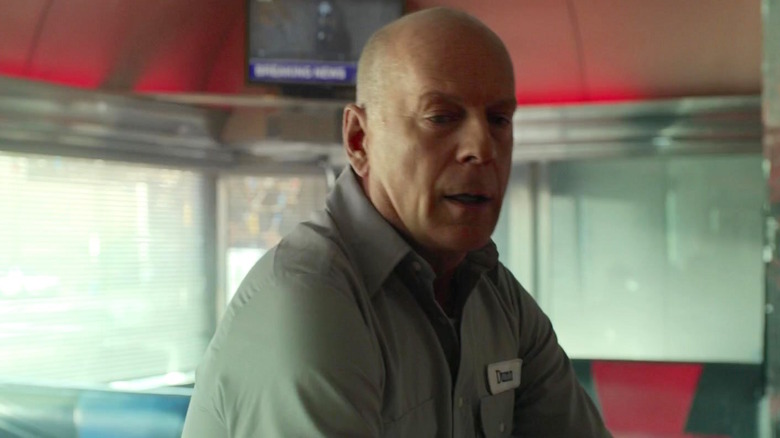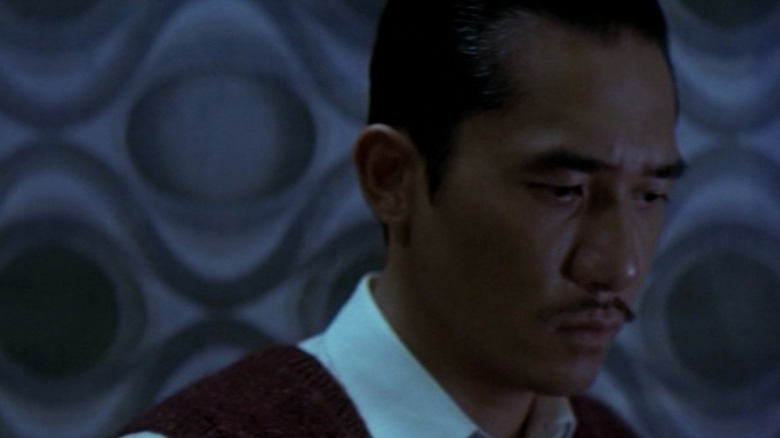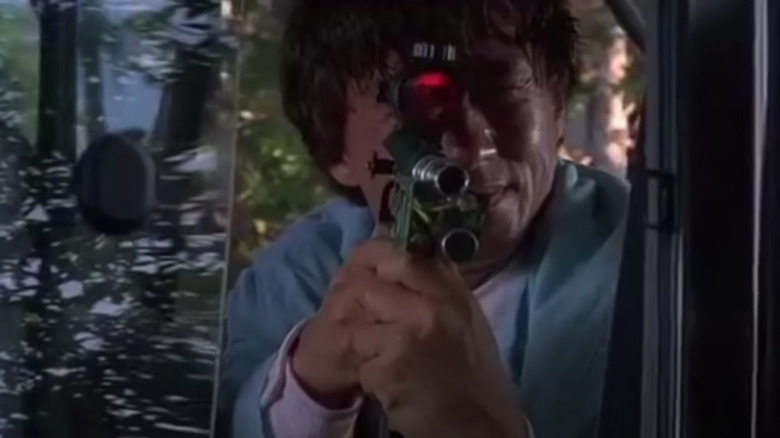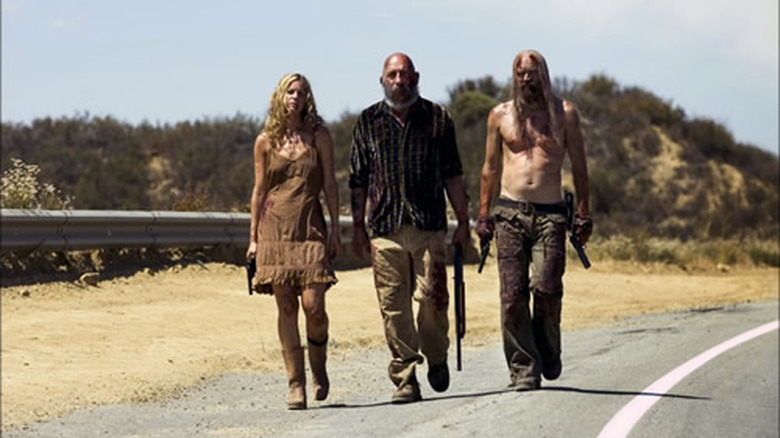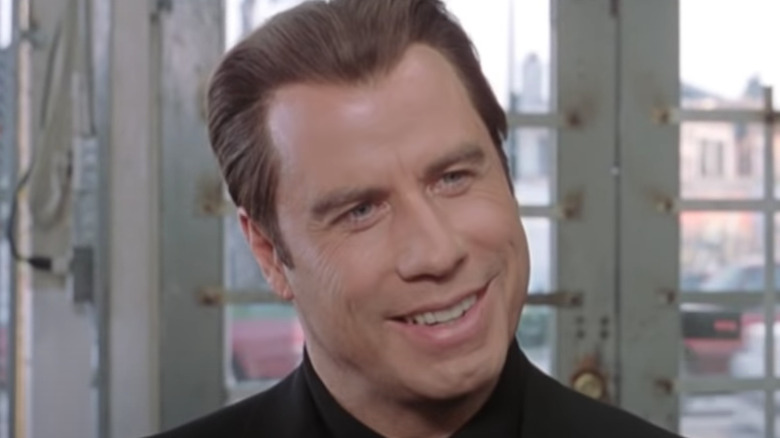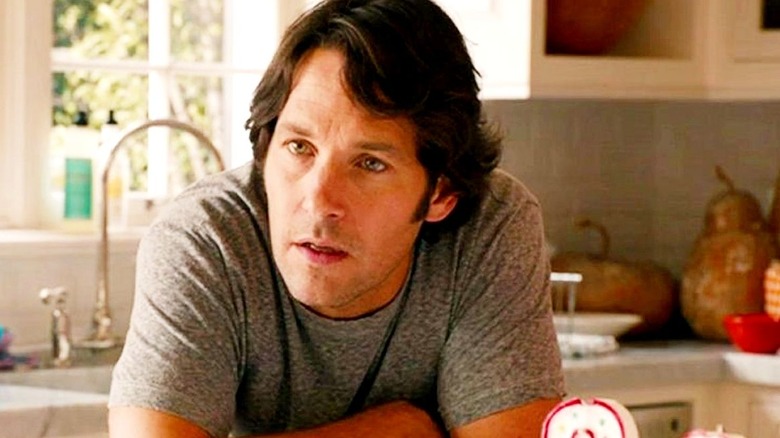12 Movies That Hid The Fact That They're Sequels
Oftentimes, a sequel is made because a story deserves a follow-up or when a fresh idea fits well into the established canon of earlier work. Other times, sequels are made with money as the only motivator by producers with dollar signs in their eyes. By far the rarest breed of follow-up are the sequels that pretend they aren't sequels.
Most sequels rely on the name recognition of the movie that preceded them to draw in audiences. Movies like "No Time to Die," "F9," or "Rogue One" wouldn't be anywhere near as lucrative as they are without the long-running, ubiquitous franchises that came before them. But some sequels choose to avoid the instant brand recognition that could be available to them. Whether their status as a sequel was kept secret so it could be a surprise to the viewer, withheld out of a sense of purity on the artistic side, or hidden for underhanded purposes on behalf of crafty international distributors, these are 12 movies that hid the fact that they were sequels.
Supercop
"Supercop" is a martial-arts action extravaganza released in 1992. The film represents the only live-action starring collaboration between two legends of the genre: Jackie Chan and Michelle Yeoh. The plot revolves around Chan and Yeoh's characters going undercover to take down a dangerous criminal organization, complete with tons of fights and death-defying stunts along the way. Although the movie was released as simply "Supercop" and marketed as a standalone film to English-language audiences, this is actually the third film in a series.
The original Chinese title of the film is "Police Story 3: Supercop." The first two movies in Jackie Chan's "Police Story" series were massively successful and influential in the Hong Kong film industry but were far less recognized and accessible in the West at the time of the third film's release. In addition to dubbing the film into English, distributor Miramax also changed the title, re-edited the film, and made substantial cuts totaling over eight minutes' worth of footage, all of which made the story of "Supercop" seem less like a sequel and more like a standalone film. Additionally, the soundtrack and sound effects were changed, a new highly-stylized opening-credits sequence was added, Jackie Chan's character had his name anglicized from Ka-Kui Chan to Kevin Chan, and changes were made to the plot that furthered distanced the story from the series that preceded it.
Gett: The Trial of Viviane Amsalem
"Gett: The Trial of Viviane Amsalem" is an Israeli drama from 2014. The film stars the highly-lauded Ronit Elkabetz in the titular role of Viviane Amsalem, a woman seeking a divorce within Israel's rabbinical marriage system, which requires the full consent of the husband. In addition to giving an incredibly impressive lead performance, Ronit Elkabetz also co-wrote and co-directed the film alongside her brother Shlomi Elkabetz. She passed away just two years later at the age of 51 as a result of cancer.
As a festival and awards darling, "Gett" had strong international appeal and broke through to far-reaching audiences around the world. Many who watched the film were completely unaware of the fact that "Gett" is the conclusion to a trilogy. The film tells what feels like a completely self-contained story, but Ronit Elkabetz had previously portrayed the Viviane Amsalem character in "To Take a Wife" and "Shiva," and all three films were written and directed by the Elkabetz siblings. Simon Abkarian also stars in all three films as Viviane's husband Eliahou, and the entire trilogy focuses on the interpersonal drama involved in their family and marriage. There was a substantial gap in time between the first two movies and the third, and "Gett" makes no mention of the previous movies, nor does it require any knowledge of the characters' backstories.
The Purity of Vengeance
"The Purity of Vengeance," which is also known as "Journal 64," was released in Denmark in 2018 and quickly became the highest-grossing movie in the history of the Danish film industry. The story follows two detectives, played by Nikolaj Lie Kaas and Fares Fares, as they investigate a disturbing mystery involving abducted girls, medical experiments, and mummified corpses. Although the story functions as a self-contained mystery plot, "The Purity of Vengeance" is actually the fourth film in the mystery thriller series known as "Department Q," which are all adapted from the novel series of the same name.
The first three films all contained the series name in their titles: "Department Q: The Keeper of Lost Causes," "Department Q: The Absent One," and "Department Q: A Conspiracy of Faith." For the fourth outing, "Department Q" was dropped from both versions of its title. This title switch-up allowed new viewers to jump right into the latest movie without feeling the need to have already seen the previous entries and undoubtedly played a role in "The Purity of Vengeance" becoming the highest-grossing entry in the series by far.
The Road Warrior
These days, most people are familiar with the "Mad Max" series as a whole from the originator to "Fury Road" and all the way to the upcoming "Furiosa." But that wasn't always the case. It took a while for the first "Mad Max" to reach international audiences as it was made with a low budget and only received a limited release at first. The sequel, however, had breakthrough power right off the bat and became an international hit straight away. Since "Mad Max" was practically unheard of in the U.S. at the time the sequel was released, its title was changed from "Mad Max II" to "The Road Warrior."
"The Road Warrior" went on to become a huge success in the U.S. as an original stand-alone film, and it wasn't until later on that audiences went back and discovered the original "Mad Max." The connective tissue between the first and second "Mad Max" movies is quite slim in the first place, so the sequel distancing itself didn't change much. With the first film lacking the budget to properly pull off the dusty post-apocalyptic future aesthetic, "Mad Max II" feels like a hard reset for the series and barely feels like it's set in the same world as the first movie anyway.
Army of Darkness
After the micro-budget indie horror flick "The Evil Dead" proved to be a surprise hit, a bigger and more polished sequel came along. "Evil Dead II: Dead by Dawn" essentially remade the first film in its opening act before continuing on and extending the story. This sequel marked a notable step up in terms of the budget and scale of the series, but it was still rooted firmly in the independent-film territory. The second "Evil Dead" ended with a wild cliffhanger that saw its main character getting sucked into a time vortex. The cliffhanger was eventually delivered on, but the third film in the series ended up changing everything.
"Army of Darkness" was the only "Evil Dead" film produced as a major studio movie and, as such, it had an astronomically higher budget. Having more money to execute your vision sounds like it would always be a good thing, but it also came with a number of drawbacks for director Sam Raimi. He no longer had complete creative control, and the studio wanted to both tone down the violence and distance the third film from the series that led to it. Universal Pictures wouldn't allow "Evil Dead" in the title because they didn't like the earlier films' reputation as gory horror flicks. Raimi's original title, "The Medieval Dead," was axed and replaced with "Army of Darkness," which was marketed as a stand-alone film despite 100% needing the context of "Evil Dead II" to make proper sense.
Split
Writer-director M. Night Shyamalan burst onto the Hollywood scene with a couple of high-quality, twisty thrillers in "The Sixth Sense" and "Unbreakable." Unfortunately, his reputation began to diminish over time with a string of less well-received movies and a few notorious disasters in a row with the likes of the critically panned "The Happening," "The Last Airbender," and "After Earth." In 2017, Shyamalan mounted a surprise return to form with "Split."
James McAvoy stars as a man with numerous split personalities who abducts three teenagers. One of the teens, played by Anya Taylor Joy, is determined to escape. What begins as a psychological thriller takes on a supernatural aspect as it moves along. It isn't until the film has come to a close that a post-end-title scene reveals "Split" to be set within the same universe as Shyamalan's earlier "Unbreakable." The two films would coalesce more directly in his next movie: "Glass."
"Split" turned out to not just be a return to form for Shyamalan but also a return to his roots. As Shyamalan revealed in an interview with Entertainment Weekly, "This character, Kevin from 'Split,' was in the original script of 'Unbreakable.'" He went on to add that portions of the "Split" screenplay "were written over 15 years ago." It took far longer than he expected, but this miniature cinematic universe eventually came to fruition.
2046
2004's "2046" is a romantic drama from acclaimed Hong Kong filmmaker Wong Kar-Wai. Tony Leung stars as an author writing a science fiction novel, and the film moves in and out of reality and the fictional world of his book. The title has many meanings as "2046" refers to the futuristic setting of the sci-fi book as well as the number of a room where nothing ever changes, which is the destination of the novel's characters. "2046" is also the number of the hotel room where Leung's character experiences the doomed romance that haunts him and is the room he currently resides next door to while writing the book in room 2047.
From the outside, "2046" appears to be a self-contained story, and one could watch the film and never realize that it was a part of a series, but they would be missing out on the bigger picture. The past romance that haunts the science fiction author isn't just character backstory, it was the subject of Wong Kar-Wai's highly-lauded 2000 film "In the Mood for Love." Tony Leung and Maggie Cheung also played the same characters a decade earlier in Wong Kar Wai's 1990 film "Days of Being Wild." Though each film can be watched and enjoyed independently, the full scope of the story and characters can only be found by watching the entire trilogy.
First Strike
"First Strike," also known as "Jackie Chan's First Strike," is a martial-arts action extravaganza. Though it wasn't strictly true, "First Strike" was marketed as Jackie Chan's first big American action movie and found his character leaving Hong Kong to help the CIA prevent a terrorist, played by Jackson Lou, from using a nuclear weapon. Despite having "first" in the title, "First Strike" is nowhere the start to a series.
The film functions as a self-contained story but is also the fourth entry in the long running "Police Story" series. The original title, "Police Story 4: First Strike," was shortened to remove the name of the series when the movie was distributed to foreign countries where there was far less name recognition attached to the "Police Story" brand. Similar to how "Supercop" was altered by the U.S. distributor to distance itself from its predecessors in the series, "First Strike" went through the same process. This time around, Jackie Chan's character name was even changed from Ka Kui to "Jackie" in the English release. Even though "Supercop" was considered a success in the U.S. after its rebranding, "First Strike" hid all ties from not just the first two "Police Story" but even "Supercop" as well, presenting itself as a completely standalone piece of work to potential audiences.
The Devil's Rejects
Although the film was critically divisive, 2005's "The Devil's Rejects" was a hit amongst horror fans and has remained Rob Zombie's most successful original film. The story follows three psychotic criminals known as the Firefly family — played by Sid Haig, Bill Moseley, and Sheri Moon Zombie (Rob Zombie's real-life wife and star of many of his films) — as they torment unsuspecting victims. They are put on the defensive when a vengeful sheriff, played by William Forsythe, proves willing to break the law to take them down, and he just might be even more disturbed than them.
The story of "The Devil's Rejects" is completely self-contained, but this trio of main characters made their first appearance two years earlier in Rob Zombie's feature film directorial debut, "House of 1000 Corpses." This first film was extremely light on story, and Zombie's background as a musician and music video director are impossible to miss and take center stage. The plot of "House of 1000 Corpses" is mostly a disposable excuse to get to the violence, but Zombie knew he was scratching at the surface of something more interesting with the Firefly family. When he revisited them in his next film, the result was a more cohesive story and a more mature film. 14 years later, Zombie revisited these characters once more in "3 from Hell."
Be Cool
"Be Cool" is a gangster comedy set in the expensive and high-profile world of the music industry. If that premise sounds familiar, it's because "Be Cool" is a sequel to "Get Shorty" and kept the same basic plot while making the simple switch of transporting gangster Chili Palmer from the film industry to the music industry. "Get Shorty" is often considered a highlight of its genre, but "Be Cool," on the other hand, has fallen into obscurity and largely been forgotten about these days despite being a full 10 years more recent than its famous predecessor.
Even though "Be Cool" featured a star-studded cast packed with the likes of John Travolta, Uma Thurman, Dwayne "The Rock" Johnson, Vince Vaughn, Harvey Keitel, Danny DeVito, and more, the film was a financial disappointment and a major critical failure. This sequel cost more than twice as much to make and brought back less money at the box office than the first movie.
With the runaway success of the original, it is a surprise that the film's marketing didn't lean more heavily into "Be Cool" being a direct sequel, though the full decade that transpired between the two films might explain that decision. One has to wonder if the film would have been more commercially successful if it were called "Get Shorty II" and had been made closer to the original, though the weak critical reception would likely have been unaltered.
This is 40
"This is 40" is a 2012 comedy from writer, director, and producer Judd Apatow. Paul Rudd and Leslie Mann (who is married to Apatow in real life) play a married couple who face a pair of mid-life crises as they both turn 40 while navigating myriad troubles in their lives and their relationship. Given how simple and down-to-earth these characters are, it was easy for audiences to miss the fact that they had seen them on screen before.
Rudd and Mann first played this particular married couple five years earlier in Judd Apatow's "Knocked Up." The two were prominent supporting characters who were upgraded to leads for "This is 40" and given their time in the spotlight. The plot of "Knocked Up" has little to no bearing on the events of "This is 40," and Seth Rogen and Katherine Heigl's two lead characters are not present. Other actors and characters shared between the two films include names like Jason Segel, Bill Hader, Charlyne Yi, and Judd Apatow and Leslie Mann's real-life daughters Maude and Iris Apatow. For a film about aging and looking back on one's youth, it makes perfect sense to revisit characters that were first explored on screen at an earlier stage in their lives.
